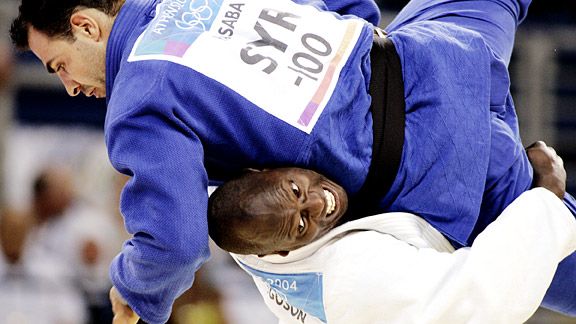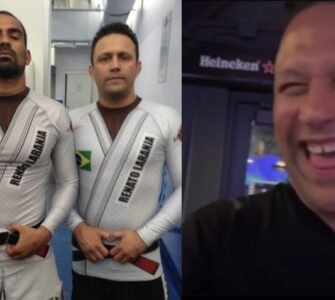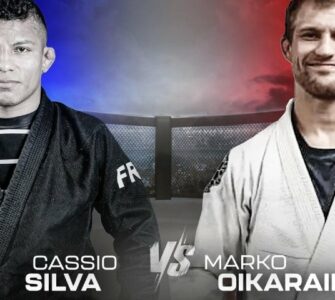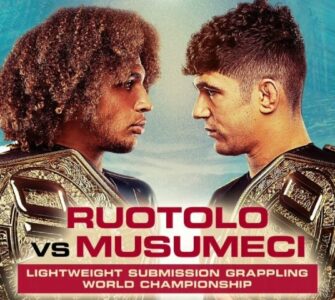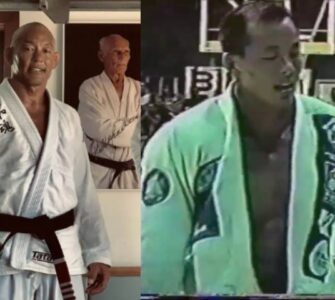Dr. Rhadi Bullard Ferguson is a Bahamian-American mixed martial arts trainer, strength and conditioning coach, motivational speaker, and black belt in judo and Brazilian jiu-jitsu. In this exclusive interview with BJJ Eastern Europe, Rhadi talks about his judo and BJJ story, how to best combine both sports, strength and conditioning and much more:
1. Hi Rhadi, can you please introduce yourself to the BJJ Community of Eastern Europe?
My name is Rhadi Bullard Ferguson. I am 38 years of age and hold the rank of Sandan in Judo (3rd degree black belt) and the rank of 2nd degree black belt in Brazilian Jiujitsu. I received my black belt in BJJ from Master Ricardo Liborio. I currently train at my dojo in Tampa, Florida. I own and operate Tampa Florida Judo and Brandon Brazilian Jiujitsu. I run a full kids program and my adult program is based upon more of a semi-private / boutique model. I devise and construct Individualized Educational Programs (IEPs) for clients in order to enhance their knowledge and the application of it through sport, if sporting excellence is their desired goal. The Judo arm of my school allows the BJJ practitioner to come in and train with me without any pushback from their current team or instructor. I do not run that type of school. I run sort of a grappling urgent care facility. You come in, get your game or techniques assessed, receive a diagnosis and then a treatment plan. As you get better, we change the prescription and continue to enhance and change your treatment profile.
I am originally from Miami, Florida. I am a second generation American. My grandparents on both sides, all four of them, are from the Bahamas. My parents were born in Miami, Florida and are first generation Americans. My grandparents were immigrants and my parents were the first wave of persons in the family to go to college. My father was the first to graduate in his family and my mother is the first in the family to earn a doctorate degree.
My main titles nowadays are that of Husband and Father, but I am very proud of earning the distinction of Olympian in the 2004. I represented the United States of American in the Games of the XXVIII Olympiad in Athens, Greece. I have also won 4 National Championships in the Sport of Judo (2000, 2001, 2003, 2005) and place second in 2002 and 2004. I also placed 3rd at the Pan American Judo Championships and 2nd and Pan American Brazilian Jiujitsu Championships. I also earned a silver medal at the Brazilian Jiujitsu World Championships in 2001.
I was the first ever person in the world to compete at the BJJ World Championships, the Abu Dhabi Submission Wrestling World Championships and the Olympic Games. I am also very proud of the time which I spent as the Head Coach of the Bahamas Judo Federation.
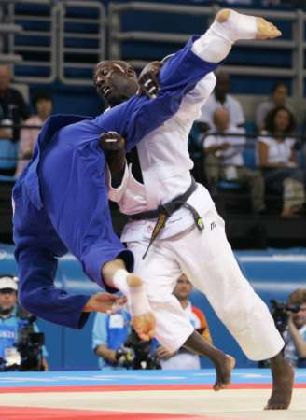
2. How hard was it to transition from top competitor and all the glory to focusing more on your academy and students?
Every competitor has a hard time switching from competitor to coach. Its not a situation of glory or being in the spotlight, it has more to do with teaching, coaching and patience. Most people that you coach are not going to have the same gifts as you. They are going to have a certain set of gifts, a certain set of special abilities, their own special powers so to speak. As a coach, it is your job to identify that “it” factor which your client possesses and facilitate in the process of bringing it forward. This is difficult in the beginning because being a great competitor DOES NOT make you a good coach. Not at all. Coaching is a profession and it takes time to get good at it. I made this mistake and my mentor at the time, Juan Carlos Santana who was my strength coach tried to make this clear to me. However, I had what we call, the gift of the curse, which is sometimes the curse of the gift. I was good at what I did. I had the “athlete mindset” which allowed me to believe that I could do or be good at anything and I would not allow someone to tell me otherwise. I believed that I had to start acting like I had what I didn’t have before I had it in order to get it. And all of these things are true, BUT the things which make us great over time, also make us not-so-great on the chronological timeline to greatness. Meaning, if Serena Williams is a great tennis player now, that means she was not-so-great before, even if she was better than everyone else. And when she started, she was not great at all. The problem with the athlete is that, the great ones, come off the gridirion, mat or field of play, as great. Then they enter into a different PROFESSION and desire to assume the same amount of respect in a different field which they have not yet earned. I DID THIS. I effed up GREATLY in this respect. And I am pretty doggone good now, but I’ve been coaching now at some of the highest levels for over 10 years now. When JC Santana tried to explain this to me years ago – several times, I might add – I wanted nothing to do with it.
And quite honestly, hurt my professional trajectory because of it, but youth is wasted on the young and my past experiences are now my educational platform.
And then there is teaching. As a former competitor, especially at the highest levels, you aren’t really good at everything. You are good at that which you know – your game. You are great at applying your expertise and getting to that area where it may be applied. As a teacher, your knowledge base requires greater breadth and depth, especially if you stay within an art where depth is needed, not just more breadth (i.e. the person who coaches MMA). What I realize when I retired was that I forgot how to teach a beginner. I had not attended a beginners class in a while. I just forgot how to do the simple things. As my strength started to decline and my superhuman conditioning, I found out that, I sucked. LOL.
I literally started attending the morning, classes at American Top Team to learn the basics again. I spent time with Dustin Denes to clean up my technique. He’s a stickler for the basics and his 2 to 3 hours sessions were mind numbing and irritating but superb. They actually helped me remember some of the things that I forgot and provided many of the steps that, in all honesty, I skipped over because I was in such a rush to be good. And none of this is bad. Being the best in the World has a window of opportunity to it. And I’m not talking about being the best in an age category or division. I mean the best in your weight class, in your sport, on the planet!! That, my dear friend, has a chronological window of opportunity associated with it and sometimes you HAVE TO SKIP steps and shortcut some things in order to reach your goal. Anybody who tells you different, doesn’t know any better. If you start your sport at the age of 5, get homeschooled, practice 5 to 6 times a week and have superb instruction, then you are one of the lucky ones who do not. If such is not the case, then you will unknowingly skip steps and use strength and conditioning to cover up your holes and that’s okay. There’s a different set of skills that you will learn in your quest to becoming the best. Unfortunately that skillset is not applicable to everyone and what’s worse, is that everybody thinks they know what it takes to be excellent. Excellence and optimum performance is its own field of study. It also requires time to achieve expertise in it.
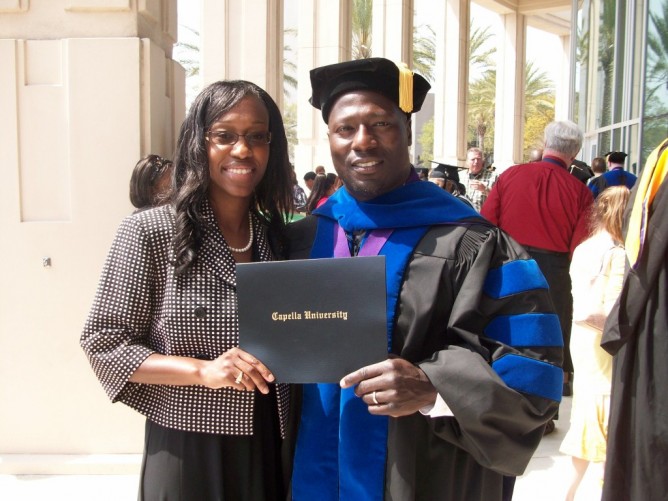
In 2009, 2004 Judo Olympian Dr. Rhadi Ferguson graduated from Capella University
3. Would you advise BJJ players to learn BJJ and Judo at the same time to become a complete grappler or to just cross train in Judo on a regular basis to work on throws?
I would advise Judo instructors to learn BJJ and BJJ instructors to learn Judo so that they can provide their students which a more complete approach to gi grappling. I also encourage cross training. You do not go to judo to learn throws, if you are a BJJ practitioner. You go to judo to round out the completion of your total game. Throws are taught in BJJ class too, or at least they should be taught, just as submissions are taught in Judo. There’s just a greater emphasis on the Newaza (matwork) in BJJ and conversely a greater emphasis on tachiwaza in Judo. The one thing that is done very well on the ground in judo and not as well on the ground in BJJ is Osaekomi Waza. The Katame Waza and Shime Waza are taught with the utmost care and attention to detail. But not the osaekomi waza. One instructor that I had in BJJ paid careful attention to this. That was Joe Moreira. But Joe Moreira was taught by one of THE BEST judo instructors in the world, Sensei Mehdi, who’s ground game was superb. Many of the Gracies were trained by him and his dojo in the late 80s and early 90s had some of the best ground fighters in the world. There is a way to turn almost any hold down or immobilization into a submission. I am not as well versed in this but I have felt the effects of those who are. In BJJ there is so much focus on the escape or the transition to submission that not much time is spent on making the control position infallible. This is just one area that I think is done very well in judo.
4. What do you think about Crossfit as a supplement to BJJ training?
I do not think that BJJ needs to be supplemented. I believe it is complete in and of itself. However, I do believe that a well constructed and devised strength and conditioning program under the guidance of a professional can be beneficial for overall health and wellness as well as an improvement in performance on the tatami.
Check out Part 2 of this interview

